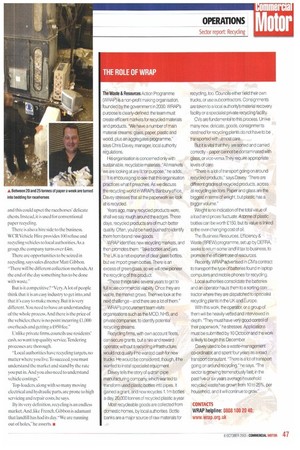THE ROLE OF WRAP
Page 47

If you've noticed an error in this article please click here to report it so we can fix it.
The Waste & Resources Action Programme (WRAP) is a non-profit making organisation, founded by the government in 2000. WRAP's purpose is clearly-defined: the team must create efficient markets for recycled materials and products. "We have a number of main material streams: glass, paper, plastic and wood, plus an aggregates programme," says Chris Davey, manager, local authority regulations.
His organisation is concerned only with sustainable, recyclable materials. "All markets we are looking at are fit for purpose," he adds.
It is encouraging to see that this organisation practices what it preaches. As we discuss the recycling world in WRAP's Banbury office, Davey stresses that all the paperwork we look at is recycled.
Years ago, many recycled products were, shall we say rough around the edges. These days, recycled products are of much better quality Often, you'd be hard pushed to identify them from brand new goods.
WRAP identifies new recycling markets, and then promotes them, 'Take bottles and jars. The UK is a net exporter of clear glass bottles, but we import green bottles. There is an excess of green glass, so we will now pioneer the recycling of this product.
"These things take several years to get to full scale commercial viability Once they are viable, the market grows. Then we look at the next challenge -and there are a lot of them," WRAP's procurement team visits organisations such as the MOD, NHS, and private companies, to identify potential recycling streams.
Recycling firms, with own account fleets, can secure grants, but a hire and reward operator, without a recycling infrastructure, would not qualify if he wanted cash for new trucks. He would be considered, though, if he wanted to install specialist equipment.
Davey tells the story of a drain pipe manufacturing company, which wanted to transform used plastic bottles into pipes. It gained a grant, and now recycles 1.1m bottles a day, 20,000 tonnes of recycled plastic a year.
Most recycleable goods are collected from domestic homes, by local authorities. Bottle banks are a major source of raw materials for recycling, too. Councils ether field their own trucks, or use subcontractors. Consignments are taken to a local authority's material recovery facility or a specialist private recycling facility.
CVs are fundamental to this process. Unlike many new, delicate, goods, consignments destined for recycling plants do not have to be transported with utmost care.
But it is vital that they are sorted and carried correctlypaper cannot be contaminated with glass, or vice-versa.They require appropriate levels of care.
'There is a lot of transport going on around recycled products," says Davey. "There are different grades of recycled products, across all recycling sectors. Paper and glass are the biggest in terms of weight, but plastic has a bigger volume."
Weight is no indication of the total value of aloud and prices fluctuate. A tonne of plastic bottles can be worth £150, but its value is linked to the ever-changing cost of oil.
The Business Resources, Efficiency & Waste (BREW) programme, set up by DEFRA, seeks to return some landfill tax to business, to promote the efficient use of resources.
Recently, WRAP advertised in CMa contract to transport the type of batteries found in laptop computers and mobile phones for recycling.
Local authorities consolidate the batteries and an operator hauls them to a sorting contractor where they are dispatched to specialist recycling plants in the UK and Europe.
With this work, the operator or a group of them will be heavily vetted and interviewed in depth. "They must have very good control of their paperwork," he stresses. Applications must be submitted by 10 October and the work is likely to begin this December.
Davey used to be a waste-management co-ordinator; and spent four years as a road transport consultant. "There is a lot of transport going on around recycling," he says. "The sector is growing tremendously fast; in the past five or six years average household recycled waste has grown from 10 to 25%, per household, and it will continue to grow."
I CONTACTS
WRAP heipiine: 0808 100 20 40; www.wrap.org.uk










































































































































































































